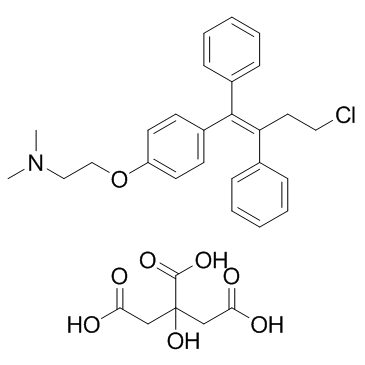89778-27-8
| Name | Toremifene Citrate |
|---|---|
| Synonyms |
2-[4-[(Z)-4-chloro-1,2-diphenylbut-1-enyl]phenoxy]-N,N-dimethylethanamine,2-hydroxypropane-1,2,3-tricarboxylic acid
2-{4-[(1Z)-4-Chloro-1,2-diphenyl-1-buten-1-yl]phenoxy}-N,N-dimethylethanamine 2-hydroxy-1,2,3-propanetricarboxylate (salt) 2-{4-[(1Z)-4-Chloro-1,2-diphenylbut-1-en-1-yl]phenoxy}-N,N-dimethylethanamine 2-hydroxypropane-1,2,3-tricarboxylate (1:1) 2-{4-[(1Z)-4-Chloro-1,2-diphenyl-1-buten-1-yl]phenoxy}-N,N-dimethylethanamine 2-hydroxy-1,2,3-propanetricarboxylate (1:1) Toremifene Citrate 2-{4-[(1Z)-4-chloro-1,2-diphenylbut-1-en-1-yl]phenoxy}-N,N-dimethylethanamine 2-hydroxypropane-1,2,3-tricarboxylate (salt) ethanamine, 2-[4-[(1Z)-4-chloro-1,2-diphenyl-1-butenyl]phenoxy]-N,N-dimethyl-, 2-hydroxy-1,2,3-propanetricarboxylate (1:1) (salt) 2-Hydroxypropan-1,2,3-tricarbonsäure--2-{4-[(1Z)-4-chlor-1,2-diphenylbut-1-en-1-yl]phenoxy}-N,N-dimethylethanamin(1:1) acide 2-hydroxypropane-1,2,3-tricarboxylique - 2-{4-[(1Z)-4-chloro-1,2-diphénylbut-1-én-1-yl]phénoxy}-N,N-diméthyléthanamine (1:1) Ethanamine, 2-[4-[(1Z)-4-chloro-1,2-diphenyl-1-buten-1-yl]phenoxy]-N,N-dimethyl-, 2-hydroxy-1,2,3-propanetricarboxylate (1:1) (salt) Toremifene (Citrate) |
| Description | Toremifene Citrate(NK 622; FC 1157a) is a second-generation selective estrogen-receptor modulator (SERM) in development for the prevention of osteoporosis.IC50 Value: 1±0.3 μMTarget: Estrogen receptorToremifene is a second-generation selective estrogen-receptor modulator (SERM) in development for the prevention of osteoporosis and other adverse effects resulting from ADT in men with prostate cancer [1]. in vitro: The growth of Ac-1 cells was inhibited by tamoxifen, toremifene and atamestane in vitro with IC50values of 1.8±1.3μM, 1±0.3μM and 60.4±17.2μM, respectively. The combination of toremifene plusatamestane was found to be better than toremifene or atamestane alone in vitro[2].in vivo: The effect of this combination was then studied in vivo using Ac-1 xenografts grown in ovariectomized female SCID mice. The mice were injected with toremifene (1000μg/day), atamestane (1000μg/day), tamoxifen (100μg/day), or the combination of toremifene plus atamestane. In this study, our results indicate that the combination of toremifene plus atamestane was as effective as toremifene or tamoxifen alone but may not provide any additional benefit over toremifene alone or tamoxifen alone[2].Clinical trail: Prostate cancer diagnosis among men with isolated high-grade intraepithelial neoplasia enrolled onto a 3-year prospective phase III clinical trial of oral toremifene[3]. |
|---|---|
| Related Catalog | |
| References |
| Density | 1.045g/cm3 |
|---|---|
| Boiling Point | 535.1ºC at 760 mmHg |
| Melting Point | 158-164ºC |
| Molecular Formula | C32H36ClNO8 |
| Molecular Weight | 598.083 |
| Flash Point | 277.4ºC |
| Exact Mass | 597.212952 |
| PSA | 144.60000 |
| LogP | 4.96650 |
| Index of Refraction | 1.416-1.418 |
| Storage condition | -20°C Freezer |
| Water Solubility | DMSO: >10mg/mL |
CHEMICAL IDENTIFICATION
HEALTH HAZARD DATAACUTE TOXICITY DATA
MUTATION DATA
|
| Symbol |



GHS05, GHS07, GHS09 |
|---|---|
| Signal Word | Danger |
| Hazard Statements | H302-H318-H410 |
| Precautionary Statements | P280-P301 + P312 + P330-P305 + P351 + P338 + P310 |
| Hazard Codes | Xi: Irritant; |
| Risk Phrases | R36/37/38 |
| Safety Phrases | 26-37/39 |
| RIDADR | UN 3077 9 / PGIII |
| RTECS | KH2156700 |
| HS Code | 2942000000 |
| HS Code | 2942000000 |
|---|


